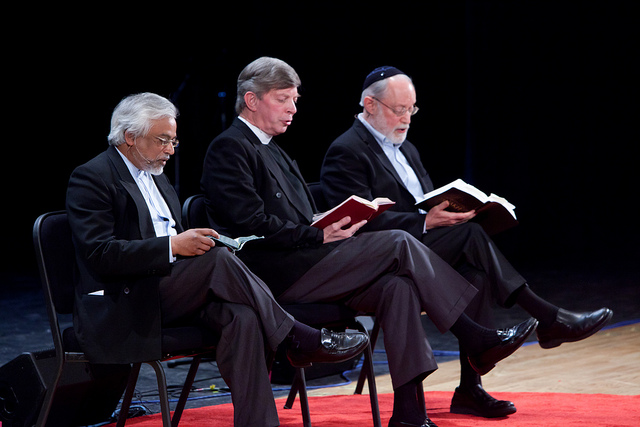Pastor Don Mackenzie, Rabbi Ted Falcon, and Imam Jamal Rahman have been working together on interfaith matters since shortly after September 11, 2001. A few years ago the trio together wrote their first book: Getting to the Heart of Interfaith: The Eye-Opening, Hope-Filled Friendship of a Pastor, a Rabbi & a Sheikh (2009). In response to the many common questions they receive at their speaking engagements, they have now written a second book: Religion Gone Astray: What We Found at the Heart of Interfaith (2011). Together, these three clerics are known as the Interfaith Amigos.
Each of these three men has experience in ministry in local bodies within his own tradition. Don Mackenzie served in parish ministry in several congregations, most recently as Minister and Head of Staff of University Congregational United Church of Christ in Seattle, WA. Ted Falcon is the founder of Makom Ohr Shalom in Los Angeles, CA (1978) and the founder of Bet Alef Meditative Synagogue in Seattle, WA (1993). Jamal Rahman is co-founder and Muslim Sufi Minister at Interfaith Community Church in Seattle, WA.
Book Basics
Religion Gone Astray: What We Found at the Heart of Interfaith offers readers the unique opportunity to learn from three interfaith leaders who have worked together extensively in the interfaith arena for a decade, and who each have significant sectarian religious leadership experience within their own traditions. While individual readers will benefit significantly, the richest possibilities are likely to arise from group discussion, which may develop from the questions provided at the end of each chapter. The cooperation of these three leaders, including their own humility and willingness to learn from one another, offers a hopeful approach that is useful to and realistic for many.
The authors have identified five stages of interfaith dialogue:
- Sharing stories to move beyond separation and fear
- Appreciating our core teachings
- In the context of our core teachings, sharing consistencies and inconsistencies
- Engaging in more difficult conversations
- Experiencing spiritual practices from other traditions (p. 5).
The book explores stage three in-depth with chapter-length explorations of four topics: exclusivity, violence, inequalities of men and women, homophobia, and revelation. Each chapter includes honest discussion by each of the three authors of how to understand these topics in light of the core teaching (Judaism – oneness, Christianity – unconditional love, and Islam – compassion) rather than isolated verses within their respective sacred texts or narrow minded historical precedents.
So What?
Interfaith engagement is incredibly important in an increasingly pluralistic and postmodern society. Low levels of religious literacy contribute negatively to impressions members of one faith have of those of other faiths. Interfaith conversations and opportunities for learning build relationships and improve understanding.
What have your own interfaith experiences been like (use the authors’ five levels to categorize them)? How is your local congregation working to provide interfaith opportunities to those already apart of their community as well as to the wider geographic community?
Pastor Don Mackenzie, Rabbi Ted Falcon, and Imam Jamal Rahman. Religion Gone Astray: What We Found at the Heart of Interfaith (SkyLight Paths Publishing, 2011). ISBN: 9781594733178.
For further interfaith study, especially between Christians and Jews, consider Rabbi James Rudin’s recent book (my review is available here): Christians & Jews – Faith to Faith: Tragic History, Promising Present, Fragile Future (2011).
